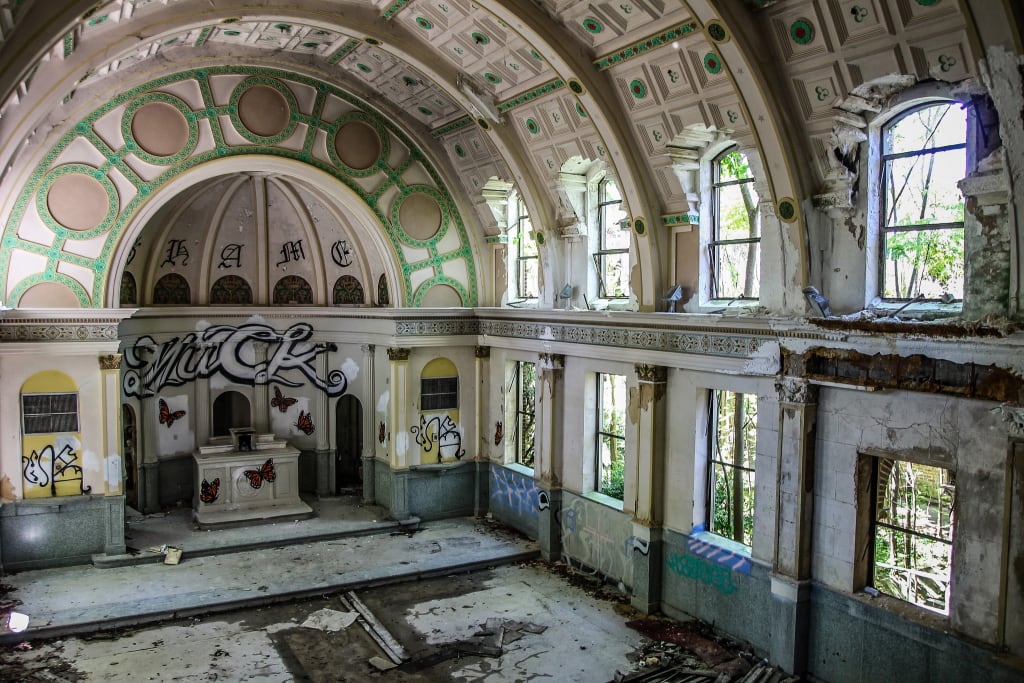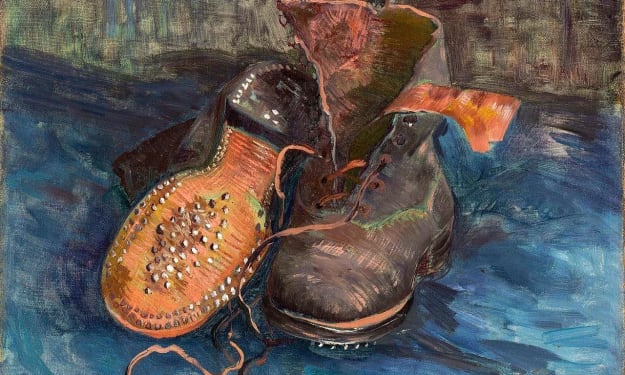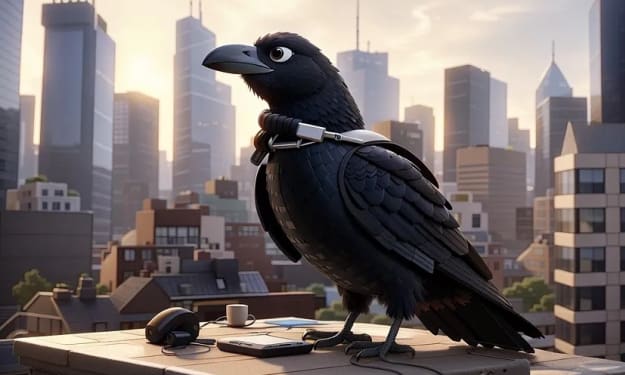When All You Want To Do Is Leave
A disease. A vocation. A paper trail. A locket. And a sister's voice.

Dolly, Dolly, come back. Her voice, like the self-soothing purr of a cat.
Many things have brought me to this empty cathedral, in this empty city. A disease. A vocation. A paper trail. A locket. Of all these things, it’s the voice that lingers. Not reproachful, not bitter; just a chant, a girl’s jump rope melody, almost meaningless.
I can hear it now, echoing through the rafters, through the shafts of dust and light, along the empty pews. The body of the priest is sprawled on the stone. His gown is hiked up over his head. Bare back covered in lacerations. It had taken him a while to die, by the look of it.
I stand at the narthex. Beside me, the pool of holy water is stagnant. Green algae covers the surface. I dip my fingers in and genuflect.
At the far end of the nave is a figure. It stands so still I can’t tell if it’s my imagination. But these days, the distinction between imagination and reality is getting fuzzy.
The shadow moves. It walks toward me.
*
When I was four years old my mother died in a bicycle accident. A tow-truck drove through a red light and sideswiped her at forty miles an hour. She was killed right away. My dad lingered for a year and then one day I came home from school to find his head resting on a pillow on the open oven door. His lower body was curled up in a fetal ball, he wore pajamas, and smiled.
My sister and I lived with an aunt until she decided that she wasn’t cut out to raise a couple kids, and then we were put into the foster care system. I was only a month away from turning sixteen and emancipating myself when 2020 happened. You thought you had lockdown bad. Try living in someone else’s house, at fifteen, with your twelve year old sister, fending off the approaches of the fifty-nine year old high school gym coach whose motive for taking on foster kids has suddenly, terrifyingly, just become clear to you.
It was a long year.
When things opened back up, summer of ‘21, I emancipated myself. My sister was still only thirteen. I promised to visit her as often as I could, to call her every day. Needless to say, this didn’t happen. I did call her a few times. But before summer was out I’d moved to Sedona and started bumming around with the New Age types, and didn’t get a chance to visit Phoenix.
My sister had a stammer, and although as a little kid she never shut up, now that she’d hit puberty and started to get a sense of herself in relation to the world, she’d grown quiet. So when I called her, I did most of the talking.
“How ya doing?”
“G-good.”
“I’ve been working on a farm here. It’s a lot cooler. The altitude’s crazy high but we still manage to get a lot to grow.”
“Great.”
Small talk like that. Which was new. We had always stayed up til morning hashing out every conceivable topic. We were all we had. Even my pajamas felt less mine than my sister’s body. Just these two sisters’ bodies against the world.
Yeah, this small talk freaked me out. We couldn’t talk about the elephant in the room. The coach. How could we? What would we say? “Hey, now that I’ve abandoned you, have you been managing to steer clear of that creep?” I didn’t want to know the answer, and she didn’t want to have to tell me.
Right before I left her, I gave her a locket. Some stupid plastic thing I’d gotten from an admirer in middle school. Shaped like a heart. Nothing inside. I almost regretted it when I saw the reverence with which she gingerly took it from my hands, not saying a word. She held it close, then put it on and tucked it under her shirt. This little plastic heart, over the real thing. Like shouting from the hilltop, “Here it is, world! My heart! The bullseye. Aim here.” I suddenly wanted to tear it off. To tell my sister to curl up in a ball, stop speaking altogether, hold her feelings inside so tightly that no one would ever be able to find them. “Hide it,” I wanted to say, the only parting advice I could give that would have any meaning. “Don’t let anyone see it.”
I stayed in Sedona until I got tired of cults leaders and crystals. I walked to Flagstaff. This took about two days. By the time I got there I was so dehydrated that I collapsed on the side of the road and lay there all day in the sun, shriveling like a raisin, until a cop picked me up and dropped me off, of all places, at the Episcopal Church. Thought I was a transient, I guess. Which I suppose I was.
I stayed in Flagstaff for the next few years. The date of my sister’s sixteenth passed. I wondered if she’d gotten out of there, or would stick it out in Phoenix through high school. Once, I tried calling. But the number was dead.
Ten years passed. I think it was ten. Time passes oddly in Flagstaff. You measure it by friends leaving and friends moving in, not by years or seasons.
*
Then the shit hit the fan. If you’re reading this, then you know all about the shit and all about the fan. Shit being disease. Fan being humanity’s inability to learn from past mistakes.
My administrative assistant died at her desk. Coughed once, loudly, and keeled over. She was last of her family to go, and there was no one but me to arrange the funeral. But by then, the mortician was dead. Embalming corpses in Tartarus, no doubt.
I don’t have to spell it out for you. You were there. News reports got more and more ramshackle as more and more people in media succumbed. One of the last things I remember hearing before Flagstaff went real quiet was that immunity was hereditary. The very few who had the disease in their system but showed no symptoms probably had a family member in the same boat.
I thought of my sister. I didn’t know where she lived, or what she did, or with whom she associated. We hadn’t spoken in years. Last I heard she had moved to California.
“I want to be by the sea,” she’d said, slowly, carefully, on the phone. Not stuttering.
“Why the sea?”
“Because when all you want to do is go, that’s where you have to stop.”
“You can always turn around.”
“N-no, you can’t.”
*
I took one last look in my office. Clutter. Case files stacked on case files. Mostly failing marriages, husbands spying on wives, wives spying on husbands. The odd runaway teen the cops didn’t want to deal with. Just a small handful of real cases. And all of the parties involved dead. Probably. Statistically.
I only had one real case after COVID-30 hit. A women who’d lost her dog. Thought it had been taken by one of the new gangs of survivors, the Sickos she said. She couldn’t pay me, but even if she had money, what good would it have done now? She fed me, which was enough, while I looked for the pekingese. Never found it.
I shut the office door softly. I didn’t bother locking anything, of course. Didn’t think I’d be back. Data privacy, now perfect, ceased being a meaningful concept.
The note said Santa Barbara. My contact said Vegas. The note came in the mail last year. The contact came late last night.
We lay in bed. A hot night. His sweaty body was too close to mine, but I was too tired to push him away. Through the open window came no human sounds. No highway noise, no distant music. It was a Friday night, I slept in an apartment above a bar that used to keep me up until 2am. These days, you’d think you were out in the boonies.
My contact coughed. “I don’t know him,” he said lowly, in response to my question. “Like I said, not an affiliate. Just a guy. Take it with a grain of salt.”
“But the Sickos? How could my sister be that stupid?”
“What so stupid about the Sickos? They’re just trying to survive, like us.”
“I dunno…” I tipped my head forward off the pillow to take a drink of lukewarm water from a glass on the bedside table. “Just feels cliche. Might as well join the fucking Road Warriors. We should have formed anarcho-syndicates and rebuilt society according to Proudhon.”
“Give me a break… ‘Proudhon.’” laughed the contact. “You’re too starry eyed for all this, Dolly.”
Was I?
I’d gone out to get some food at the Farmer’s Market: one stall, at the far end of the city hall parking lot, at which once a week an old man gave away vegetables to whoever’d come for them. When I got back, the contact was gone. He just left a note that said “Tucson first.”
But I went to Tucson second. First, I stopped by the coach’s house in Fountain Hills, Phoenix. He and his wife were in bed, the covers pulled right up to their chins. They looked like they’d been dead for just a few weeks. I went to our old bedroom, the one my sister and I shared. It had been redecorated. Nothing of ours remained. In the closet, I found a shoebox full of photographs. I took one look at the polaroid sitting on the top and burned them all in the driveway. I cried, and slept in my car down the street.
Next, Tucson. The contact had told me to go there first.
When I got to the safe-house, an old dog pound, I almost didn’t go in. The smell. Then I heard a gentle voice singing from inside.
“Dolly!” said the old man, pausing his song. “Haven't seen you in months.” He sat on a stool, in the middle of a room full of dead dogs bleeding on the concrete floor. In his hand, he held a gelding knife. There was a wild look in his eye.
“How ya doing, Gary?” I asked carefully.
“Been a bad day. But I’m feeling better now.”
“That’s good.”
“What can I do for you?”
“Did Ron say I was coming?” I asked.
“Haven’t heard from Ron in months.”
“You okay, Gary?”
“Like I said,” Gary looked down at the gelding knife, and let it drop on the concrete. “Been a hard day. Had to get rid of all my boys. They got sick. Didn’t want to see them suffer.”
“I’m sorry.”
“It’s alright.”
“Ron didn’t say I was coming?”
“I told you; haven’t seen him in months. Heard he went bad.”
If it were true, then he sent me to Tucson because he didn’t want me to go to Vegas. Not at all, or not yet? To save me from something? To keep my from something? Had he “gone bad?”
I left right away and made the trip in seven hours. Ron’s contact had given me nothing but an address. A cookie-cutter house in the middle of suburbia, far from the Strip. The house was totally empty, wall to wall. Whoever had lived here had stripped the place clean when they’d taken off.
Not entirely empty, though. In the center of the kitchen floor were two small objects. One was a note, with the name and address of a cathedral in Santa Barbara. The other was a locket, shaped like a heart.
*
So here I am. My last case. Just me and that shadow walking toward me.
Dolly, Dolly. Come back.
Here I am, Grace. Here I am. Here I am.
About the Creator
Eric Dovigi
I am a writer and musician living in Arizona. I write about weird specific emotions I feel. I didn't like high school. I eat out too much. I stand 5'11" in basketball shoes.
Twitter: @DovigiEric






Comments
There are no comments for this story
Be the first to respond and start the conversation.